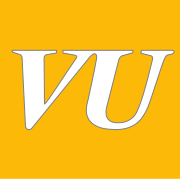
Vlaams Blok was the name of a Belgian far-right and secessionist political party with an anti-immigration platform. Its ideologies embraced Flemish nationalism, calling for the independence of Flanders. The party originated from split within the Volksunie (VU) party after the right-wing separatist and national conservative wing became disgruntled with the compromise of accepting Belgian federalism over Flemish interests, and what they saw as the VU's move to the left. The former VU members created the Flemish National Party (VNP) and the Flemish People's Party (VVP) which formed an electoral alliance called Vlaams Blok in 1978, before merging to create Vlaams Blok as a political party in 1979. Vlaams Blok was the most notable militant right wing of the Flemish movement and its track record in the Flemish and Belgian parliament elections was strong, making it one of the most successful nationalist parties in Western Europe and it ultimately surpassed the People's Union in support. The party initially focused solely on the issues of Flemish autonomy and political freedom, which remained its core philosophy, but subsequently gained wider public support through broadening its campaigns to include immigration and law-and-order themes.

The Open Flemish Liberals and Democrats is a Flemish conservative liberal political party in Belgium. A smaller fraction within the party has social liberal views.

The New Flemish Alliance is a Flemish nationalist and conservative political party in Belgium. The party was established in 2001 by the right-leaning faction of the centrist-nationalist People's Union (VU).

Sociaal-Liberale Partij was a Belgian Flemish political party formed after dissolution of the moderate nationalist People's Union (Volksunie) party. Prior to 19 April 2008 it was known as Spirit, and intermediately as Flemish Progressives (VlaamsProgressieven). The party merged with Groen in the end of 2009, ceasing to exist.

The Flemish Movement is an umbrella term which encompasses various political groups in the Belgian region of Flanders and, less commonly, in French Flanders. Ideologically, it encompasses groups which have sought to promote Flemish culture and the Dutch language as well as those seeking greater political autonomy for Flanders within Belgium. It also encompassed nationalists who seek the secession of Flanders from Belgium, either through outright independence or unification with the Netherlands.

Flanders is both a cultural community and an economic region within the Belgian state, and has significant autonomy.
Regionalism is a political ideology that seeks to increase the political power, influence and self-determination of the people of one or more subnational regions. It focuses on the "development of a political or social system based on one or more" regions and/or the national, normative or economic interests of a specific region, group of regions or another subnational entity, gaining strength from or aiming to strengthen the "consciousness of and loyalty to a distinct region with a homogeneous population", similarly to nationalism. More specifically, "regionalism refers to three distinct elements: movements demanding territorial autonomy within unitary states; the organization of the central state on a regional basis for the delivery of its policies including regional development policies; political decentralization and regional autonomy".
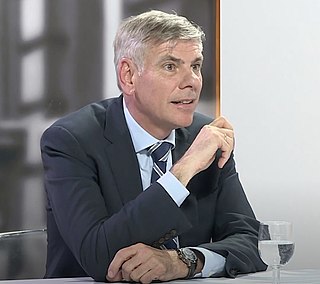
Philip Michel Frans "Filip" Dewinter is a Belgian politician, journalist and commentator. He is one of the leading members of Vlaams Belang, a right-wing Flemish nationalist and secessionist political party.
Vlaams Belang is a Flemish nationalist and right-wing populist political party in the Flemish Region and Brussels Capital Region of Belgium. It is widely considered to be on the political far-right, although it self-describes as centre-right.

Flemish political parties operate in the whole Flemish Community, which covers the unilingual Flemish Region and the bilingual Brussels-Capital Region. In the latter, they compete with French-speaking parties that all also operate in Wallonia. There are very few parties that operate on a national level in Belgium. Flanders generally tends to vote for right-wing, conservative parties, whereas in French-speaking Belgium the socialist party is usually the most successful one.

The Order of Flemish Militants – originally the Flemish Militants Organisation – was a Flemish nationalist activist group in Belgium defending far-right interests by propaganda and political action. Established in 1949, they helped found the People's Union in 1954, a Belgian political party. The links between the extremist VMO and the VU lessened as the party moved towards the centre. In later decades the VMO would become linked to neo-Nazism and a series of paramilitary attacks on immigrants and leftists before disappearing by the late 1980s.
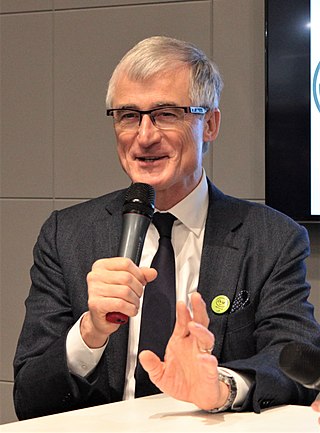
Geert Albert Bourgeois is a Belgian politician of the New Flemish Alliance (N-VA), which he founded in 2001, who is currently serving as a Member of the European Parliament since 2019. He previously served as the Minister-President of Flanders from 2014 to 2019. Prior to this, he was a member of the federal Chamber of Representatives for the People's Union from 1995 to 2001, and then for the N-VA from 2001 to 2004. He has been involved in local and regional politics in Flanders since 1976.
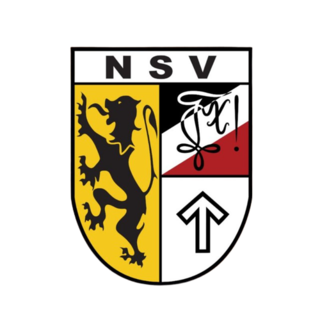
The Nationalistische Studentenvereniging (NSV) (Dutch; "Nationalist Student Association") is a far-right Flemish nationalist student political group in Belgium, with chapters in Antwerp, Brussels, Ghent, Leuven, West Flanders (including Bruges, Roeselare, Ostend and Kortrijk), Hasselt and Mechelen.
Hugo Schiltz was a Belgian lawyer and politician. He was Belgian MP from 1965 to 1988 and senator from 1992 to 1995. He was also twice minister, from 1981 to 1985 in the first Flemish Government and between 1988 and 1991 in the Belgian federal government Martens VIII. He was further president of the Flemish political party Volksunie between 1975 and 1979.
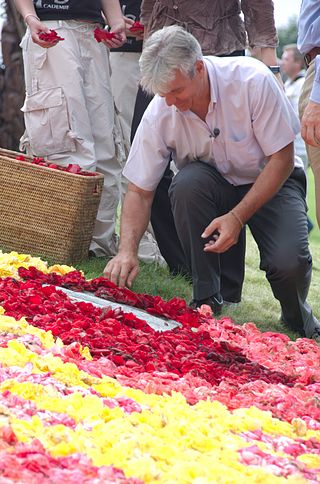
Bert Jozef Herman Vic Anciaux is a Belgian politician and Vooruit faction leader in the Belgian Senate. He was one of the founders of Spirit. Served as Minister for Culture, Youth and Sport in the Flemish Government from 2004 until 2009, he was also Minister for relations with the Brussels-Capital Region and the Brussels Parliament.

Libertarian, Direct, Democratic is a conservative-liberal, libertarian, right-wing populist Flemish political party in Belgium.
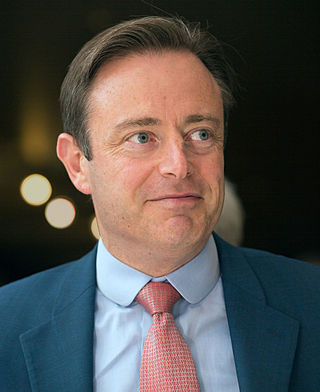
Bart Albert Liliane De Wever is a Belgian politician. Since 2004, De Wever has been the leader of the New Flemish Alliance (N-VA), a political party advocating for the independence of Flanders. He is also a member of the Chamber of Representatives. De Wever presided over his party's victory in the 2010 federal elections when N-VA became the largest party in both Flanders and in Belgium as a whole.
Katholiek Vlaams Hoogstudentenverbond (KVHV) or the Catholic Flemish Students' Union is a political student society which concerns Flemish nationalism and conservatism. It accepts male and female members and has chapters in Ghent, Leuven, Antwerp, Brussels, Aalst and Sint-Katelijne-Waver. Previously KVHV had chapters in Kortrijk, Ostend, and Mechelen.
Lode Claes was a Belgian economist author, journalist and politician who was active within the Flemish nationalist movement.
